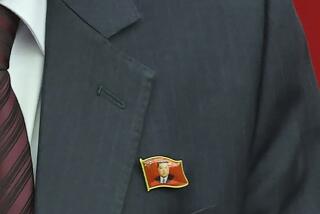N. Korea’s Kim Shuffles Cabinet
- Share via
SEOUL — North Korean leader Kim Jong Il has reshuffled his Cabinet, replacing veteran, septuagenarian ministers with younger technocrats in what South Korean intelligence officials are calling a prelude to long-overdue economic reforms.
The changes were announced Wednesday during a closed meeting of the Supreme People’s Assembly, North Korea’s rubber-stamp legislature. Details about the new ministers have been seeping out from the secretive communist state.
“They are less ideological and more oriented toward improving the economy,” said a high-ranking South Korean official who requested anonymity. “We are seeing a rapid rise of the technocrats. These are pragmatic people.”
Political changes in North Korea normally occur at a glacial pace and so by that standard, this overhaul is emerging as a dramatic event.
The last time Kim replaced a significant number of ministers was in 1998.
There are eight new ministers in the 31-member Cabinet, including a new prime minister, Pak Pong Ju, 64, a former chemical industries minister. He replaces Hong Song Nam, who is in his mid-70s and served in the post for seven years. Some of the other ministers are in their 40s and 50s.
In a speech to the assembly last week, Pak pledged that the new government would “establish on a large scale scientific and economic strategies and operations which meet the demand of the new century.”
Three of the new ministers, including the prime minister, visited South Korea as part of an economic delegation in October. One South Korean intelligence official, who met the North Koreans in Seoul during that visit, said they seemed eager to learn and open to new ideas.
“They asked a lot of questions. They took very detailed notes. They asked for a lot of documents,” said the intelligence official, who asked not to be named.
One of the new ministers, Pak Nam Gil, who heads the legislature’s budget committee, lamented that “it’s a pity I have only two eyes so I can’t see more in such a short time,” according to the intelligence official.
Koh Yu Hwan, a North Korea expert with Seoul’s Dongguk University, said North Korea had been carefully studying South Korea under the 1960s and 1970s rule of Park Chung Hee, an uncompromising dictator who nonetheless is widely credited for the country’s rapid economic development.
“They are looking at the South Korea model as it applies to themselves, while also taking lessons from China and Cuba,” Koh said. He cautioned, though, that the Cabinet overhaul was not a purge but an adjustment. “We are not seeing revolutionary change in North Korea. They are maintaining their basic power structure.”
There has been no indication that the new Cabinet will depart from Kim’s long-stated policy of according the military top priority or from the pursuit of nuclear weapons.
South Korean newspapers reported Monday that the North might display a new multistage missile -- believed to have a range of 1,800 miles -- during military celebrations this week marking the 55th anniversary of the country’s founding.
While a standoff with the United States over nuclear weapons continues, North Korea has made several moves in recent weeks to improve its relations with the South. The first charter flights between Seoul and Pyongyang are supposed to start as early as this month thanks to a travel agency affiliated with the Rev. Sun Myung Moon’s Unification Church. A large tourist complex -- also designed to raise money from South Korean visitors -- is being built at Mt. Paekdu, an extinct volcano at the Chinese border. A large South Korean industrial park just north of the demilitarized zone broke ground in June.
North Korea watchers caution, however, that it will be impossible for the country to overhaul its moribund economy without improving its relationship with the United States.
Cho Myong Chol, a former economics professor at Kim Il Sung University in Pyongyang who defected to South Korea, said that the new North Korean Cabinet ministers, several of whom he knows, have more experience in science and industry but little in government. He also said that the younger government ministers have had less exposure to the outside world than those of the older generation, who at least had traveled within the communist bloc.
“I’m not optimistic that these technocrats will be able to do much,” Cho said. “Kim Jong Il seems to think he can solve the problems of his country through technology and not through real change in the system.”
More to Read
Sign up for Essential California
The most important California stories and recommendations in your inbox every morning.
You may occasionally receive promotional content from the Los Angeles Times.










